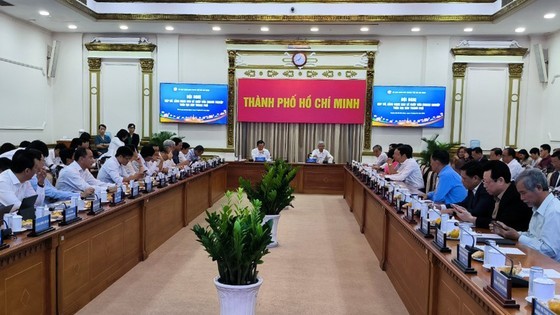 |
The scene of the meeting. (Photo: SGGP) |
The conference was attended by Mr. Nguyen Van Nen, Secretary of the HCMC Party Committee, Mr. Vo Van Hoan, Vice Chairman of the HCMC People's Committee, and more than 100 delegates representing associations, businesses, departments, and agencies.
At the conference, Mr. Vo Van Hoan said that GRDP reached 9.03 percent in 2022, higher than the city's target of 6-6.5 percent and higher than the national average GRDP of 6 percent. Besides, the targets of budget revenue, job creation, and social security all achieved good results. To be able to achieve these results, the city recognized the synchronous, harmonious, and responsible participation of departments, agencies, localities, businesses, and people.
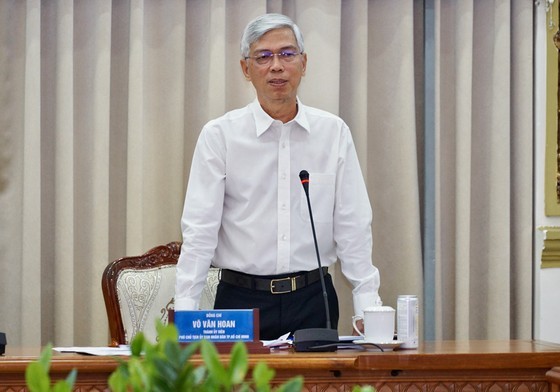 |
Mr. Vo Van Hoan, Vice Chairman of the HCMC People's Committee, speaks at the meeting. (Photo: SGGP) |
However, since the end of 2022, the situation has become complicated, affecting comprehensively business operations in many fields. A lot of negative information has been sent to the city government, requiring the city to have solutions to remove and create momentum to accelerate the city’s economic growth.
Regarding this issue, Mr. Nguyen Ngoc Hoa, Chairman of the HCMC Union of Business Association, said that from the fourth quarter of 2022, production and business activities had slowed down, and the number of enterprises with increased revenue only accounted for 22 percent, compared to the ratio of 26 percent in the previous quarter.
Regarding the workforce, some businesses are allowing employees to work in shifts or take long holidays, which is unusual compared to previous years, because they have no reserve orders.
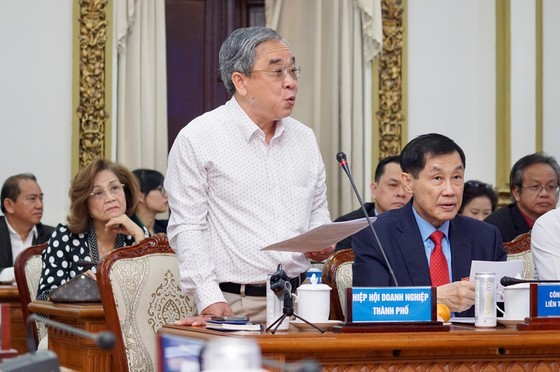 |
Mr. Nguyen Ngoc Hoa, Chairman of the HCMC Union of Business Association, speaks at the meeting. (Photo: SGGP) |
In addition, the association's survey also showed that the number of businesses with an average salary of over VND10 million per month decreased from 80 percent in the second quarter of 2022 to 65 percent in this quarter. This is a signal alarming many upcoming difficulties in the labor market.
In the export sector, due to high inflation in the main export markets of textiles and garments, such as the US and EU with up to 6-7 percent, consumption slumped markedly, (the EU dropped by 60 percent, and the US decreased by 30-40 percent), and inventory increased to 20-25 percent, causing customers to limit or not place new orders in the fourth quarter of 2022 and the first quarter of 2023.
Specifically, orders for November and December lacked about 35-50 percent of capacity, or there were orders with fierce competition on prices as many customers offered prices only 50 percent or even 40 percent of the normal price level. As a result, many enterprises have had to cut labor and reduce production scale since the end of 2022.
According to Mr. Hoa, some industries are facing serious difficulties. First of all, the wood processing industry saw a sharp drop in the number of orders and had to operate moderately, especially domestic enterprises (wood chip and pellet exports increased, but mainly thanks to foreign and FDI enterprises). In fact, only 10 percent of enterprises have 50 percent of orders left, 50 percent of enterprises have 30-40 percent of orders, and the rest have none. Therefore, enterprises have faced high inventory and financial crunch.
Currently, the real estate sector encounters difficulties and tends to go into recession. The most obvious proof is that the market is shrinking business scale, stopping investment, and suspending construction of new projects. The market is almost frozen, and this situation probably lasts a long time.
It is worth mentioning that the stagnation of the real estate market has affected many related industries. For example, the building materials industry is recording a serious decline in domestic and international markets. Specifically, the current steel price fell by 60 percent due to the excessive supply while the demand declined, leading to a decrease of 69.3 percent in steel export output.
Cement factories experienced a slump, exports dropped by 55 percent, and the domestic market sank because public investment and real estate projects froze, with businesses owing each other. Employees were being laid off, seriously affecting social welfare and livelihoods.
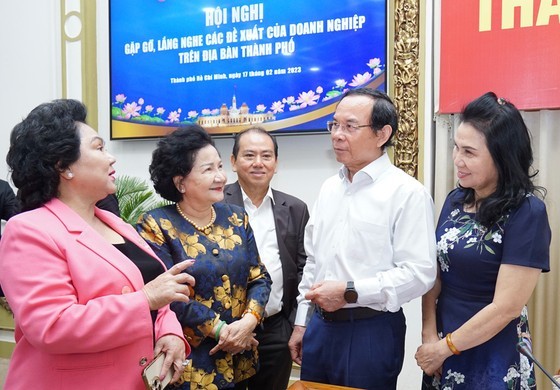 |
Mr. Nguyen Van Nen discusses with representatives of associations and enterprises. (Photo: SGGP) |
On the other hand, due to bond volatility and tight credit control, the economy lacked liquidity. Investors showed signs of losing confidence in some banks, so the capital mobilization ability weakened. The SBV's policy on credit risk management and control was not synchronous. The 2-percent interest rate support package was less feasible and hard to implement because some enterprises were concerned about paperwork and inspection.
Based on these actual difficulties, Mr. Nguyen Ngoc Hoa, on behalf of city-based enterprises, suggested to the city many recommendations that need to be implemented to remove obstacles for them.
Accordingly, in terms of State policies, it is necessary to support capital and credit. In addition, the State Bank of Vietnam should take measures to lower capital mobilization interest rates of commercial banks, controlling the net interest margin ratio at 3 percent. It is also a necessary solution for commercial banks to share difficulties with the current economy to lower lending interest rates. Moreover, the State needs to continue implementing the loan extension policy for one year in 2023 for medium and long-term loans.
For the bond and financial markets, it is recommended that the Government have policies for issuers to extend, buyback, or settle debts with bondholders. Accordingly, bonds with collateral and a term of one year or less are extended for 12 months, and bonds with a term of 3 years or more are extended for 18 months. Because the confidence of bondholders has been shaken, the Government should issue the above policy to help stabilize the financial market.
As for tax support policies, over the past time, the Government has exempted and extended tax payments for value-added tax, corporate income tax, and land rent. However, incentives related to personal income tax have not been implemented for wage earners, who are greatly affected by the recent Covid-19 pandemic. Therefore, the personal income tax exemption and reduction in 2023 is essential.
At the same time, to solve the extremely difficult situation of enterprises, the State should continue to apply the VAT rate of 8 percent to all economic sectors, with the application period until the end of 2023. Other taxes should also be considered for exemption or reduction to share difficulties with enterprises and encourage economic development in the current cutthroat international competitive market.
The government needs to implement the revised import and export tax law thoroughly and should end the situation in which import tariff is only 0-10 percent or exempted when importing completely-built equipment and machinery, while domestic machine manufacturers must import raw materials, components, and spare parts with an import tax of up to 15 percent as currently. In addition, the State needs to drastically direct the settlement of tax refunds on time for businesses, helping them to develop.
As for the city, many enterprises suggested that it should simplify administrative procedures to improve the business investment environment. In which, the process of application appraisal needs to be simplified; legal institutions should be implemented to reduce informal charges. It is necessary to consider expanding beneficiary sectors and increasing the loan amount from the investment stimulus program so that the program has a spillover effect and businesses have more favorable access to capital.
The city needs to focus on solving the backlog of paperwork related to the ownership of land, factories (rent or purchase), and completion of construction to enable businesses and people to have legal ownership of their property, which can be used as collateral for bank loans for production and business activities.
The city considers granting permits for the development of high-tech agricultural production and rectifying the current situation of construction and business inspection with many shortcomings, at the same time, reviewing the land lease policy, creating conditions for enterprises to mortgage the value of the leased land and properties on the leased land for bank loans, thereby encouraging them to stay in the city instead of moving to neighboring provinces, such as Long An, Binh Duong, Binh Phuoc, and Tay Ninh, as currently.
* Mr. Do Phuoc Tong, Chairman of the HCMC Electromechanical Association:
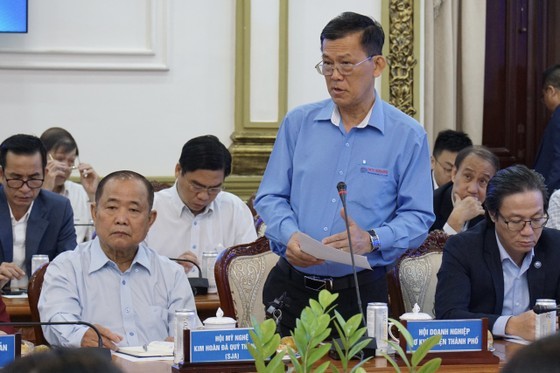 |
Mechanical enterprises have small and super small scales, so capital is thin, and internal resources are limited. In fact, the city has issued a policy to support interest rates for the industry, but access to loans with low interest rates remains limited.
Even though many businesses have been approved by the city for demand stimulus loans, the disbursement time is slow, causing them to face difficulties. Some company leaders even had to sell houses to settle loans with banks or sell their businesses to FDI enterprises to be safe.
Moreover, regulations on the origin of goods when participating in the bidding, especially public bidding, are a big barrier for businesses. Currently, according to popular bidding standards, products participating in bidding must meet G7 standards. However, Vietnamese products cannot meet this standard.
Therefore, to be able to legalize this standard, domestic enterprises had to temporarily export to a neighboring country to get the G7 origin and then return to Vietnam to complete the bidding paperwork. This situation has lasted for many years, suppressing the development of businesses. The above difficulties need to be resolved soon.
* Mrs. Ly Kim Chi, Chairwoman of the HCMC Food and Foodstuff Association:
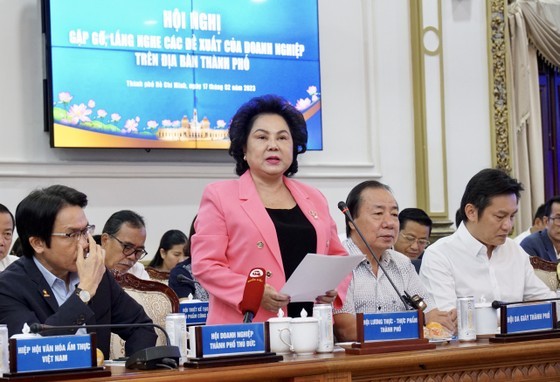 |
Currently, the interest rate for business loans is over 10 percent, which is the issue that most concerns businesses. When combined with the increasing costs of electricity, water, and raw materials, the high interest rate leads to extremely low profit margins, causing many businesses to struggle.
Moreover, there is a risk that well-established medium and large-sized enterprises may be acquired by foreign investors or investment funds. Therefore, a comprehensive support policy is needed for interest rates, capital, investment, and raw material growing areas to help businesses increase their production capacity.
* Ms. Dang Minh Phuong, Chairwoman of the HCMC Logistics Association:
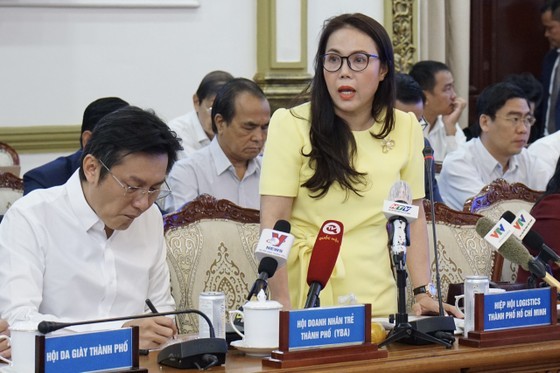 |
Logistics is the lowest-profit industry but requires a high investment and operating costs. In reality, the city's transportation infrastructure has not kept up with the pace of economic growth, causing traffic congestion, especially around the port area, leading to high operating costs for the logistics industry.
For example, at the Cat Lai port, the planned capacity was to handle 3 million TEUs, but, in reality, it is receiving 5 million TEUs and nearly 8 million TEUs in the near future. As a result, the traffic congestion around the port area is always severe, which increases the operating costs of logistics companies and reduces the competitiveness of the industry.
According to Ms. Phuong, to support the development of logistics enterprises, the city should have a policy to reduce VAT and corporate income tax, as well as lower 50 percent of road infrastructure fees and port fees.
Regarding fire safety regulations, the criteria should be reviewed because they are currently higher than those in the US. This criterion forces businesses to increase their construction costs by an additional 30 percent, which has a significant impact on the internal competitiveness of businesses.
Additionally, the city should soon put into operation a system of expressways and elevated roads, along with building inland waterways and ports to reduce traffic congestion and operating costs for the logistics industry.
* Mr. Hua Phu Doan, Vice Chairman of the HCMC Medical Equipment Association:
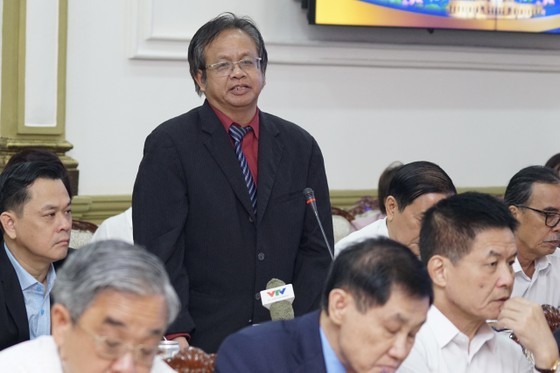 |
The biggest challenge in the medical equipment business is the process of applying for product circulation licenses (type C, D). The speed of processing these applications is extremely slow.
Out of 5,000 applications submitted to the medical equipment department, only about 300-400 are processed. On average, it takes 1-2 years to obtain a product circulation license for type C and D products, making novelty no longer exist.
The medical equipment manufacturing sector in Vietnam is almost stagnant and unable to develop due to the following reasons: The mechanism for applying for a license to produce medical equipment domestically remains complicated, making businesses hesitant to invest in medical equipment production.
The supply chain for supporting technology in the medical equipment industry is very rare, almost non-existent, and does not meet the demands for medical equipment production.
The city does not have policies to support trade promotion for domestic medical equipment businesses to participate in domestic and foreign exhibitions. In addition, the city does not have an industrial park specializing in the production of medical equipment to stimulate the supporting technology industry for medical equipment, such as electronics, mechanics, and artificial intelligence software.
On that basis, the association suggests that the city should have policies to support and invest in building the supply chain for the supporting technologies of the medical equipment industry. The city needs to develop a medical equipment industrial park within the existing industrial zones.
From another perspective, it is necessary to propose to the central Government to improve administrative procedures for product circulation permits of medical equipment, and organize and manage the bidding for medical equipment procurement scientifically and reasonably, avoiding group interests in bidding for medical equipment.
Especially, there should be policies to support domestic medical equipment manufacturing companies to participate in domestic and international trade fairs and promotion programs. It is also necessary to deploy the establishment of institutes and centers for testing and verifying medical equipment in various forms.
























